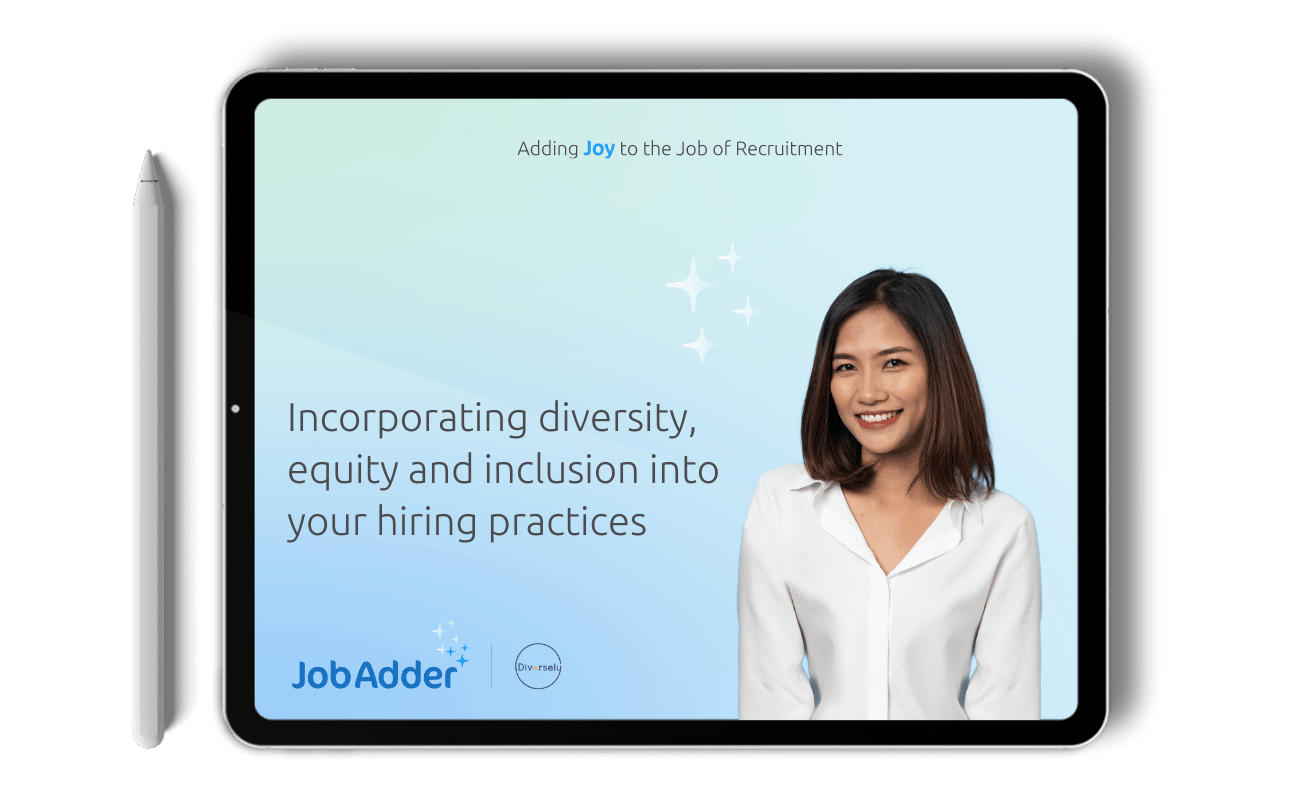Recruitment Blog
How your job titles may be hurting your diversity

In traditional organisations, job titles, especially the prefixes Senior and Junior are considered essential. These determine hierarchy, the scope of work, salary bandwidth, benefit package eligibility, where you can sit, whether your emails are prioritised and other factors.
In the changing world of work, where organisations are flatter, job scopes are blurred and innovation and creativity are essential, we should ask ourselves: are job titles still good practice and do they work for or against your organisation?
In this article, we’ll show you why traditional job titles might be hurting your internal organisation, your recruitment funnel and specifically the diversity of your workforce. And it’s not just job titles, using years of experience as a requirement for a job, for example, “5+ years in …”, “10+ years as a…” or even “up to 3 years” can lead to relevant and capable applicants disqualifying themselves or being disqualified. No need to despair though, we’ll also be offering alternatives that are more effective in defining what a job is about, what’s required to be successful in a role and what ultimately helps to attract more relevant and more diverse applicants.
FREE eBOOK DOWNLOAD: Incorporating diversity, equity and inclusion into your hiring practices
What’s the issue with job titles?
Let’s step back and consider what purpose job titles fill. Job titles help others inside and outside of your organisation to understand what you do, or what they could expect someone in your role to do.
In the context of posting a job ad, the job title should describe the content of the job in as few words as possible, as accurately as possible and entice relevant applicants to check out the body of the job ad – quite similar to a newspaper title.
So, why is it becoming increasingly difficult to decipher job titles? Well, there’s probably two main reasons, either job titles are becoming:
1. Too generic and internally focused that nobody else has any clue what you’re talking about; or
2. Too creative and inflated that they lose their meaning in an attempt to be cute, different, modern…
Generic and vague job titles
Let me share some examples of (1), from my own career. I ask you, what do you think I actually DID in any of these roles?
a. Executive Transaction Services
b. Associate Director Operational Excellence
c. Business Analyst
No clue? No worries, that’s why I never introduced myself using any of these job titles.
When asked (at the usual networking events or family gatherings) what I do, I’d usually describe what I actually DO. Something along the lines of:
a. I advise my business clients on the company’s financial valuation and risks during mergers
b. I manage a team that improve the bank’s processes and ways of working, to achieve better operational performance
c. I create financial risk management reports for the CFO
Creative and inflated job titles
Now for some examples of (2), I’ve actually enjoyed researching some of these, and the BBC has a fun collection from their readers, so here goes:
a. Environmental Maintenance Officer
– Garbage collector (trying too hard to make it sound impressive)
b. Chief Chatter
– Call Centre Manager (trying too hard to be cute)
c. Director of Life Enrichment
– Organising and implementing a program of therapeutic activities (what are they trying!?)
Hurting your recruitment and your diversity
As you may have noticed, also from my examples above, job titles traditionally contain two elements: a description of the responsibilities of the role and an indication of the seniority/level of experience required.
To summarise the problem, increasingly job titles are not helpful at describing the responsibilities of the role and due to inflation of seniority levels, they leave everyone second-guessing what level of experience is actually required.
So how does this hurt your recruitment and diversity, you may ask…
Within your organisation, bad job titles create more office politics, rather than a culture of actually getting work done. It becomes more about moving up the ranks, than actually delivering meaningful work. It’s generally known that some people are better at climbing the ladder, due to their perceived capabilities and network. Let’s just say that usually those aren’t your under-represented minority groups. So… bad for your internal diversity.
When recruiting, bad job titles can and will make you miss out on relevant applicants… either because they never find your job – it’s too vague and/or doesn’t reflect their search criteria – or they do find it and self-disqualify because they don’t recognise themselves in the job title or don’t think they’re a fit, either because of the job title’s role description part, or the seniority part. If candidates aren’t finding your openings, you’re not going to fill them.
Want to improve diversity in your recruitment? Access our free eBook with Diversely now.

How should we write our job titles to be more impactful?
Something as simple as rewriting your job titles could really help. Now that we’ve seen some examples of BAD practices, what are examples of GOOD job titles?
4 simple practices to improve your job titles
Avoid industry jargon: Using industry-specific terms and abbreviations will only make sense to people within that specific industry. You’ll be closing the door to anyone from a (slightly) different background and applicants with transferrable skills.
Just because you’re not a LEAN practitioner (or know the abbreviation) doesn’t mean you couldn’t very well run a process improvement project.
Describe what the role does: Make it specific so that an applicant, or the person in the job, can envision from the job title what they’ll be doing, in their day-to-day.
“Merger financial valuation advisor” is a lot more descriptive and informative than “Executive transaction services,” for example.
Describe seniority in terms of responsibilities: Rather than using terms like junior, senior, director etc., describe what that means for the responsibilities of the role. Are they managing or directing a team, a project, a P&L, a sales target or what?
A Managing Director of Sales might be responsible for leading a team of hundreds, while in another organisation they might not have a team and manage large sales accounts alone.
Don’t make it too long: It’s about getting an applicant’s attention and helping them assess whether it’s relevant, not writing a book. Make sure to only include what’s essential, the rest you can add to the job description.
A good structure (and some examples) might look like this:
JOB TITLE =
[MAIN ROLE ACTIVITY] + [DESCRIPTION RESPONSIBILITY] + [RELEVANT CONTEXT]
Financial valuation + consultant + mergers and acquisition
Process improvement + team lead + banking operations
Head of sales + diversity software startup + US and Europe
Hopefully, this equation and the good practices shared earlier, will help you write more impactful and clear job titles. Practice makes perfect, so why don’t you take a couple of your jobs and try!
How do Diversely’s tools help you?
At Diversely, we equip recruiters and hiring managers with tools to be more inclusive in their hiring and remove bias from their talent attraction.
Across our tools, you’ll find tool tips, guiding you towards more inclusive practices. When writing up your job parameters, some points we address:
Job title: Focus the title on what the job actually does, dropping industry jargon. We refer to all the good (and bad) practices shared in our blog above.
Flexible working options: For the type of job or contract, try to be flexible. If it’s possible to do the job full-time or part-time, permanently or on a contract basis, remotely or in the office, why choose? Flexible working options can be a way to differentiate yourself and you can and should add as many options here as possible.
Hard and soft skills: Challenge yourself on each of the skills you add here, are they absolutely critical to the job? A long list might deter otherwise qualified candidates so include up to 3 skills here, preferably less. Remember you can always add some ‘nice to haves’ in the job description, so prioritise.
Studies reveal that successful teams comprise a range of personality profiles to work effectively. So when selecting traits, are you simply defining a carbon copy of yourself/the manager/the rest of the team? Have you considered how different traits might benefit the existing team dynamics?
Transferrable skills: Are there transferrable skills you can consider? If so, let applicants know they don’t need to exactly meet all the hard and soft skills you’ve listed in the job ad. Team members from different industries, backgrounds and roles can bring a wealth of creativity and critical thinking to your existing teams.
Salary range: We highly advise adding a salary range to your job ad. Research by LinkedIn and Glassdoor show this will give you a competitive advantage when trying to attract candidates. That’s because most job seekers look first at a position’s compensation and benefits, then at the role and requirements. Beware, certain job boards even mandate salary ranges as a field to even post your jobs with them.
We like to host guest blogs from our expert integration partners so you’ll find that this blog was originally published by Diversely here.
Related blog posts

Lack of diversity in the workplace has become an increasingly prominent issue in the tech industry and it’s particularly apparent …
Ready to get started?
Talk to one of our friendly team members


